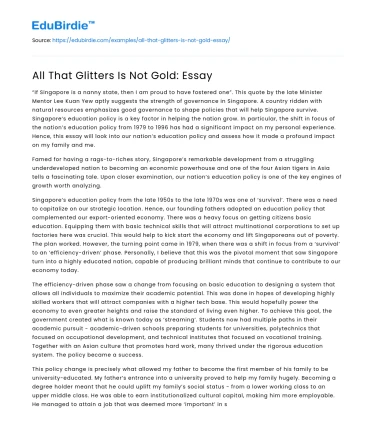“If Singapore is a nanny state, then I am proud to have fostered one”. This quote by the late Minister Mentor Lee Kuan Yew aptly suggests the strength of governance in Singapore. A country ridden with natural resources emphasizes good governance to shape policies that will help Singapore survive. Singapore’s education policy is a key factor in helping the nation grow. In particular, the shift in focus of the nation’s education policy from 1979 to 1996 has had a significant impact on my personal experience. Hence, this essay will look into our nation’s education policy and assess how it made a profound impact on my family and me.
Famed for having a rags-to-riches story, Singapore’s remarkable development from a struggling underdeveloped nation to becoming an economic powerhouse and one of the four Asian tigers in Asia tells a fascinating tale. Upon closer examination, our nation’s education policy is one of the key engines of growth worth analyzing.
Save your time!
We can take care of your essay
- Proper editing and formatting
- Free revision, title page, and bibliography
- Flexible prices and money-back guarantee
Singapore’s education policy from the late 1950s to the late 1970s was one of ‘survival’. There was a need to capitalize on our strategic location. Hence, our founding fathers adopted an education policy that complemented our export-oriented economy. There was a heavy focus on getting citizens basic education. Equipping them with basic technical skills that will attract multinational corporations to set up factories here was crucial. This would help to kick start the economy and lift Singaporeans out of poverty. The plan worked. However, the turning point came in 1979, when there was a shift in focus from a ‘survival’ to an ‘efficiency-driven’ phase. Personally, I believe that this was the pivotal moment that saw Singapore turn into a highly educated nation, capable of producing brilliant minds that continue to contribute to our economy today.
The efficiency-driven phase saw a change from focusing on basic education to designing a system that allows all individuals to maximize their academic potential. This was done in hopes of developing highly skilled workers that will attract companies with a higher tech base. This would hopefully power the economy to even greater heights and raise the standard of living even higher. To achieve this goal, the government created what is known today as ‘streaming’. Students now had multiple paths in their academic pursuit - academic-driven schools preparing students for universities, polytechnics that focused on occupational development, and technical institutes that focused on vocational training. Together with an Asian culture that promotes hard work, many thrived under the rigorous education system. The policy became a success.
This policy change is precisely what allowed my father to become the first member of his family to be university-educated. My father’s entrance into a university proved to help my family hugely. Becoming a degree holder meant that he could uplift my family’s social status - from a lower working class to an upper middle class. He was able to earn institutionalized cultural capital, making him more employable. He managed to attain a job that was deemed more ‘important’ in society.
However, my father’s recount of his university experience in Green Bay, Wisconsin, highlights the contrast between Eastern and Western culture. Growing up in an era without the Internet, he did not have much access to information regarding overseas universities. Everything he knew prior to his move to Wisconsin was through physical collaterals. Hence, when he arrived in the States, he experienced a huge culture shock. Everything from the way people spoke to the food they ate was a stark contrast to our beloved Singlish accent and chicken rice. He mentioned that it was incredibly hard to find Asian food in America, especially in the Eighties when globalization had not taken off. Furthermore, the low censorship in America created a liberal and ‘wild’ culture. This was a stark contrast to tightly controlled and ‘nanny state’ Singapore. More than just culture shock, he also experienced racism. He came to figure out that many Americans were unaware of Asians and viewed them as an ‘exotic breed’. He attributes this to the representation of Asians in media, carrying a mysterious demeanor and speaking broken English with a heavy Chinese accent. As a member of the minority, he would have to brave comments regarding his skin color and height. After living in the States for over a decade, he experienced re-entry shock upon arriving back in Singapore. He had developed an American accent and other ‘American’ habits such as slang that made him ‘mainstream’ during his stay in America.
My father grew up in a time when Singapore shifted its policy in the hopes of producing exquisite minds that could productively contribute to the economy. My father was able to thrive. Because of him, I was fortunate enough to be born into an upper-middle-class family. My father’s success has allowed me to live a privileged life. He was able to move our family into a home along Bukit Timah in order to send my sister and me to the top schools. We attended many extracurricular classes such as ballet and piano. Whenever we were struggling in school, my parents could easily hire tutors for help. I lead a life drastically different from the humble beginnings of my parents' generation. I am fortunate to have experienced such intergenerational upward mobility.
All that glitters is not gold. It is by chance that I was born into a family that has benefited from such a policy change. However, my father’s case should not be viewed without acknowledging that the Singaporean dream - flourishing in this education, and attaining the ‘5Cs’ should be taken with a pinch of salt. Underneath the fairytale-like story of our education policy lies a hard truth - a ‘pressure cooker system’ that has seen the downfall of many others as well, creating an ever-increasing gap in society.






 Stuck on your essay?
Stuck on your essay?

